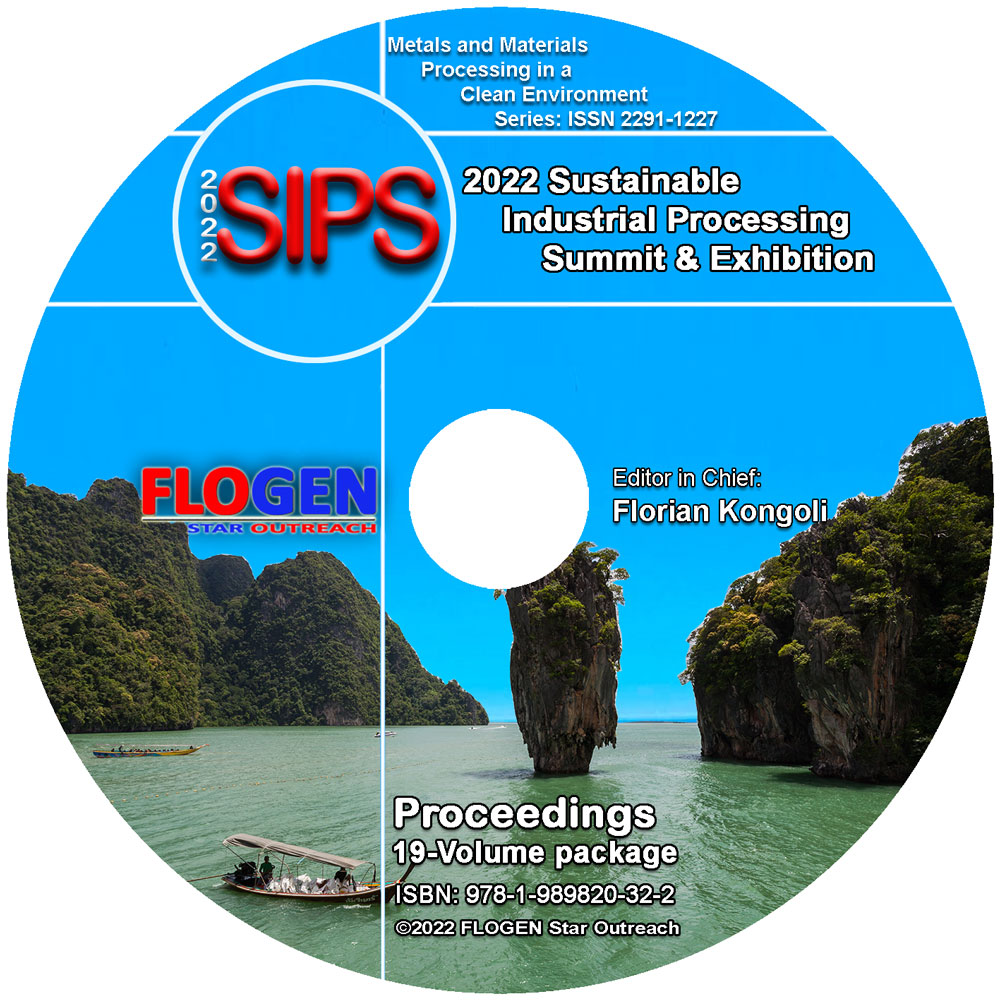2022-Sustainable Industrial Processing Summit
SIPS2022 Volume 8 Mauntz Intl. Symp. Energy Production
| Editors: | F. Kongoli, H. Dodds, S. Atnaw, T. Turna. |
| Publisher: | Flogen Star OUTREACH |
| Publication Year: | 2022 |
| Pages: | 266 pages |
| ISBN: | 978-1-989820-48-3(CD) |
| ISSN: | 2291-1227 (Metals and Materials Processing in a Clean Environment Series) |

CD shopping page
Evaluation of Energy and CO2 Emission of Heat pumps for Electric Vehicles
Hyun Joon Chung1; Chung Ho Lee2; Jong Hyun Park2; Yu Min Choi2; Young In Jung2; Chasik Park2; Hoseong Lee3;1HOSEO UNIVERSITY, Asan, South Korea; 2HOSEO UNIVERSITY, Asan-si, South Korea; 3KOREA AUTOMOTIVE TECHNOLOGY INSTITUTE, Chonan, South Korea;
Type of Paper: Regular
Id Paper: 403
Topic: 17
Abstract:
This work presents an energy, exergy, and environmental evaluation of a novel compound PV/T (photovoltaic thermal) waste heat driven ejector-heat pump system for simultaneous data center cooling and waste heat recovery for district heating networks. The system uses PV/T waste heat with an evaporative-condenser as a driving force for an ejector while exploiting the generated electric power to operate the heat pump compressor and pumps. The vapor compression system assessed several environmentally friendly strategies. The study compares eleven lower global warming potential (GWP) refrigerants from different ASHRAE safety groups (R450A, R513A, R515A, R515B, R516A, R152a, R444A, R1234ze(E), R1234yf, R290, and R1243zf) with the hydrofluorocarbon (HFC) R134a. The results prove that the system presents a remarkable overall performance enhancement for all investigated refrigerants in both modes. Regarding the energy analysis, the cooling coefficient of performance (COPC) enhancement ranges from 15% to 54% compared with a traditional R134a heat pump. The most pronounced COPC enhancement is caused by R515B (a 54% COPC enhancement and 49% heating COP enhancement), followed by R515A and R1234ze(E). Concerning the exergy analysis, R515B shows the lowest exergy destruction, with the highest exergy efficiency than all investigated refrigerants.
Keywords:
Energy; Engineering; Environment;References:
Yicheol Choi,,Wonsuk Lee, Manhee Park, Yonghyun Choi, “Heating Performance Evaluations for Development of Heat Pump System on Battery Electric Vehicle“ KSAE Fall Conference Proceedings, pp.559-563 , 2011Ji Soo Park, Jae Young Han, Sung-Soo Kim, Sang Seok Yu, “Characteristic of Cabin Temperature According to Thermal Load Condition of Heat Pump for Electric Vehicleâ€, Transactions of the Korean Society of Mechanical Engineers - B 40(2), pp.85-91, 2016
Hyoung Suk Woo, Jae Hwan Ahn, Myoung Su Oh, Hoon Kang, Yongchan Kim "Study on the Heating Performance Characteristics of a Heat Pump System Utilizing Air and Waste Heat Source for Electric Vehicles" Korean Journal of Air-Conditioning and Refrigeration Engineering 25(4), pp180-186, 2013